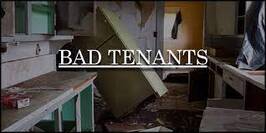|
Tenant Version
|
7 ILLEGAL RENTAL AGREEMENT CLAUSES THAT
COULD MAKE YOUR LEASE UNENFORCEABLE |
Resident Bill of Rights
|
Tips to Peace and Enjoyment
|
As members of the believer of Apartment Associations, we take pride in providing quality rental homes for our residents. We value our residents and recognize our partnership with them in maintaining the rental housing industry.
We believe residents should be aware of their rights in this partnership. Therefore, know that,
|
Protect what matters most.
This Information is provided by Moving.com a company that provides as service for the moving family call them and have it done right the first time.
|
Remember, you may not own the building in which you live, but you still need to have insurance to protect your property in the case of fire, theft or other hazards.
There are two big myths about renters insurance.
Renting an apartment without insurance is a pretty big gamble considering that without it, you face the cost of replacing your personal belongings after an event such as fire or theft. What’s more, you could face the prospect of defending yourself in a lawsuit because of some accident for which you might be held legally responsible, whether it happened in your residence or elsewhere. In many cases, for less than a couple hundred dollars a year you can protect your valuables (like furniture and clothes) from loss by fire, theft, wind and water damage or other covered hazards.
|
Renters insurance can help with things like:
Living in Denial But many renters still don’t believe they need such insurance. A survey conducted by Cambridge Reports, Inc. for the Insurance Information Institute found that fewer than three out of every 10 renters purchase renters insurance. Many renters mistakenly believe their landlord’s insurance will cover their own belongings. In fact, it would be extremely rare for a landlord’s policy to extend to tenants’ property. To determine how much insurance coverage you’ll need, take a complete inventory of your personal items. An insurance agent can help with this by estimating the total value of your property. Types of Insurance
You’ll also need to decide whether to opt for depreciated or limited replacement cost coverage. Depreciated coverage is the cost to repair or replace your belongings minus depreciation. Let’s say you bought a quality sofa with an expected useful life of 10 years. If it’s now five years old and would cost about $1,000 to replace, you could expect to receive about $500 (less deductible) if your sofa was destroyed by fire. You would pay slightly more for limited replacement cost coverage, but you could expect to receive $1,000 for your sofa minus your deductible. You should also keep in mind that insurance coverage for some types of personal property is limited in terms of dollars. Renters insurance also gives you personal legal liability coverage and medical payments to others who are accidentally injured while in your home or apartment or elsewhere if the injuries are caused by your actions. And, if you are forced to live elsewhere because of damage to your residence due to a covered loss, renters insurance covers additional living expenses. |




